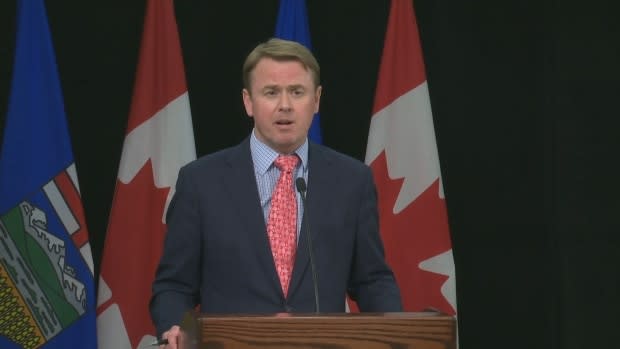OPINION | Doctors' heated dispute with Kenney government a creature of politics and history
This column is an opinion. For more information about our commentary section, please read this editor's blog and our FAQ.
How did we get into this mess?
How did Alberta — in the midst of a pandemic — end up with a war between the provincial government and physicians?
And how did the two sides get so far apart they practically need binoculars to see each other?
The government says the main issue is money; the doctors say it's respect.
The government tore up the doctors' master agreement in February; the doctors (via the Alberta Medical Association) launched a $250-million lawsuit against the government in March.
Last week, the AMA said a survey of its members indicated 42 per cent are so unhappy they are considering leaving the province. Shandro ridiculed the survey results but this week took steps to ensure doctors can't leave the province en masse.
This week, the AMA took out full page newspaper ads once again accusing the government of bad faith bargaining but asking for talks to resume; Shandro rejected the ads as a meaningless negotiating tactic.
It'd be tempting to dismiss the conflict as simply contract negotiations run amuck.
Of course, that ignores the fact we're still in the midst of the COVID-19 pandemic and physicians are, to put it mildly, important.
But there are two other reasons why this shouldn't be written off a simple contract dispute: Bill 30, and history.
Last week, the government introduced Bill 30, the Health Statutes Amendment Act, that would among other things, permit more private delivery of health care (still paid for by public dollars), change how doctors can be paid, and allow the government to place more of its appointees on health oversight committees.

Premier Jason Kenney says the government is simply making the health care system more efficient and accountable while trying to shorten wait times for surgeries and "keeping our commitment for public, universally accessible health care."
That's not true, says NDP leader Rachel Notley. As far as she's concerned, Kenney is "opening the floodgates to more private health care. The bill allows for-profit corporations to contract for insured health services even at a demonstrable detriment to the public health system. It's not modernization, it's Americanization."
Notley, though, realizes whatever she says will be dismissed as yet another partisan attack on the government. So, she's been advising journalists to talk to Lorian Hardcastle, an associate professor of law and medicine at the University of Calgary. Hardcastle co-wrote an op-ed in the Edmonton Journal this week warning that Bill 30 opens the way to more private-for-profit health care.
"There are also concerns that quality of care may suffer when medical care is delivered in corporate-owned facilities due to incentives to cut corners to maximize shareholder profits," wrote Hardcastle. "We have already seen this tragically play out in the context of for-profit nursing homes."
Klein's attempted health-care coup
Then there's the issue of history. The debate swirling around health-care today sounds ominously like debates under previous Conservative governments in Alberta, most notably that of Ralph Klein two decades ago.
Klein wanted more "choice" in health care that included private clinics with overnight stays (effectively private hospitals) and doctors allowed to work in both the public system and a separate private system. Klein said major changes would improve health care while saving the province money.
In 2002 he bragged "spectacular" reforms to health care would "create a bit of a firestorm" and "a lot of protests." In 2004, he told his caucus his "unCanadian plans" might "contravene the interpretation of the Canada Health Act and that we ought to be ready for a firestorm."
In the end, Klein's ambitions for massive health care reform were blunted by pushback from the federal government and the Alberta public.
But as the cost of health care continued to rise, the talk of more private healthcare among conservative-minded circles continued apace.
That's why whenever a Conservative government in Alberta muses about changes to the system, critics are reminded of Klein's attempted health-care coup.
But even Klein didn't antagonize the province's physicians to the extent achieved by the Kenney government.
During debate in the legislature, Kenney has tried to undermine the credibility of doctors by referring to them as affluent "members of the one percent club" who should share in the province's economic pain. Shandro has threatened to release the billings of individual doctors, reasoning that because there's a "sunshine list" for civil servants' salaries, there should be one for taxpayer-funded doctors, too.
Except the two groups aren't comparable.
A senior member of Kenney's staff making $200,000, for example, doesn't have to pay office rent, office expenses and office staff. Doctors do.
The AMA says take-home pay for Alberta doctors is on par with other provinces.
But money is a red herring.
The dispute between the doctors and government is arguably less about compensation and more about power and influence in the health care system. Albertans should be asking themselves when it comes to safeguarding the future of health care, who do they trust more: the government or their doctor?

